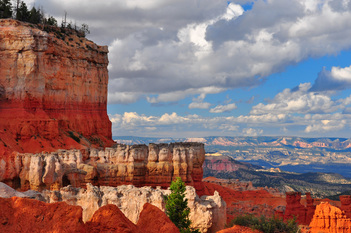|
The Heavens Declare the Glory of God: Psalm 19, part 1 by Tami Jelinek Listen to Tami read this article here:  Red Sandstone Cliffs
at Bryce Canyon
Many of us are familiar with this passage, and have understood it to speak of a general revelation from nature of the existence of God, and the beauty of His creation. Like many other “familiar” Old Testament passages, this one becomes “new” when understood in light of the apostles’ interpretation of it. It is a whole new world. You might even say it is a whole new heavens and earth.
We are the heavens, and it is our purpose, our glory, to declare His glory. Let us consider this as we look at Psalm 19:1-6. Psalm 19: 1-3 The heavens declare the glory of God; and the firmament sheweth his handywork. 2 Day unto day uttereth speech, and night unto night sheweth knowledge. 3 There is no speech nor language, where their [the heavens'] voice is not heard. Compare this personification of heavens uttering speech to: Romans 1:8 First, I thank my God through Jesus Christ for you all, that your faith is spoken of throughout the whole world. Colossians 1:6 Which [the truth of the gospel] is come unto you, as it is in all the world; and bringeth forth fruit, as it doth also in you, since the day ye heard of it, and knew the grace of God in truth: At first we might say that is a nice application, or spiritualization of a passage speaking about nature. But look at the next verse, followed by the Apostle Paul's direct reference to it: Psalm 19:4 Their line is gone out through all the earth, and their words to the end of the world. Romans 10: 16 –18 But they have not all obeyed the gospel. For Esaias saith, Lord, who hath believed our report 17 So then faith cometh by hearing, and hearing by the word of God. 18 But I say, Have they not heard? Yes verily, their sound went into all the earth, and their words unto the ends of the world. So there is nothing for us to “spiritualize” when Paul, in his divinely inspired commentary on this Psalm of David, states the message going out from the “heavens” is the gospel of Jesus Christ, making “the heavens” themselves the “declarers” of that gospel, also referred to (see Psalm 19:1) as His glory. Now that we know God’s Word refers to us His people as “the heavens,” and the gospel we declare as His glory, let us continue in the passage and see what else is said of us in Him, and Him in us: Psalm 19:4b In them [the heavens] hath he set a tabernacle for the sun. Compare the tabernacle for the sun to: Ephesians 2:22 In whom ye also are builded together for an habitation of God through the Spirit. 2 Corinthians 5:1 For we know that if our earthly house of this tabernacle were dissolved, we have a building of God, an house not made with hands, eternal in the heavens. Revelation 21:3 And I heard a great voice out of heaven saying, Behold, the tabernacle of God is with men, and he will dwell with them, and they shall be his people, and God himself shall be with them, and be their God. Psalm 19 declares "the heavens" (which we have already seen refers to God's people) have been made into a tabernacle for the sun. We should see from the context thatthe "sun" here refers to Christ, and this will be further confirmed later in the psalm. The Ephesians passage speaks of us being "built together" in Christ for a "habitation of God." 2 Corinthians refers to a "building from God, eternal in the heavens." Finally, in Revelation 21 we read that the "tabernacle of God is with men." Continuing in the psalm: Psalm 19:5 Which [the sun] is as a bridegroom coming out of his chamber, and rejoiceth as a strong man to run a race. Further confirming the “sun” refers to Christ, we see Him also described as a “bridegroom”. Compare His rejoicing to: Zephaniah 3:17 The Lord your God in your midst, the Mighty One, will save; He will rejoice over you with gladness, He will quiet you with His love, He will rejoice over you with singing. Hebrews 2: 11, 12 For both he that sanctifieth and they who are sanctified are all of one: for which cause he is not ashamed to call them brethren, 12 Saying, I will declare thy name unto my brethren, in the midst of the church will I sing praise unto thee. Now compare His running the race to: Hebrews 12: 1-3… let us run with patience the race that is set before us, 2 Looking unto Jesus the author and finisher of our faith; who for the joy that was set before him endured the cross, despising the shame, and is set down at the right hand of the throne of God. 3 For consider him that endured such contradiction of sinners against himself, lest ye be wearied and faint in your minds. The race that was set before those first century believers: He ran it first. He was the author and finisher. As they looked forward to the receipt of their inheritance, their “building from God, eternal in the heavens,” they were to consider what He did lest they became weary, knowing it was for the joy set before Him that He endured. That joy was none other than the restoration of God’s presence with His people: I Peter 3:18 For Christ also hath once suffered for sins, the just for the unjust, that he might bring us to God, Psalm 16:11…in thy presence is fulness of joy; at thy right hand there are pleasures for evermore. We know that in the New Covenant, the New Heavens and Earth, we are fully in His presence, having been made the very righteousness of God by the power of the cross. He rejoices over us and lives in us. We have become as “the heavens,” and as “a tabernacle for the sun.” The joy which was set before Him as He endured the cross is now our joy eternally. Verse 6 further describes the “sun”: Psalm 19:6 His going forth is from the end of the heaven, and his circuit unto the ends of it: and there is nothing hid from the heat thereof. Keeping our context in mind, and having established that we are the heavens, and what we declare is the gospel or glory of God, and that Christ dwells in us and goes before us with joy; it is no surprise that here in verse 6 it is not merely the message going forth, but the sun (Son) Himself. The glory we, the heavens, declare is Christ. Christ in us. And there is nothing hidden from its (His) heat. Compare this omnipresent heat of the sun to: Hebrews 4:12,13 For the word of God is quick, and powerful, and sharper than any twoedged sword, piercing even to the dividing asunder of soul and spirit, and of the joints and marrow, and is a discerner of the thoughts and intents of the heart. 13 Neither is there any creature that is not manifest in his sight: but all things are naked and opened unto the eyes of him with whom we have to do. Psalm 139:7 Whither shall I go from thy spirit? or whither shall I flee from thy presence? In conclusion, coming back to the “familiar” (literal) interpretation of “the heavens declare the glory of God,” we need not deduce that seeing the deeper meaning behind the metaphor precludes us from applying “the glory of God” to His physical creation; for indeed all creation testifies to His wonderful works. For believers, upon understanding who the heavens are, and what the glory is they declare, this passage can become again what we thought it was about before. Looking up at the stars, we will still be reminded of the glory of God displayed through His creation. But now more than that, looking up at the stars, we will preeminently be reminded of the glory of God displayed through His New Creation. Isaiah 60:18-21 Violence shall no more be heard in thy land, wasting nor destruction within thy borders; but thou shalt call thy walls Salvation, and thy gates Praise. 19 The sun shall be no more thy light by day; neither for brightness shall the moon give light unto thee: but the LORD shall be unto thee an everlasting light, and thy God thy glory. 20 Thy sun shall no more go down; neither shall thy moon withdraw itself: for the LORD shall be thine everlasting light, and the days of thy mourning shall be ended. 21 Thy people also shall be all righteous: they shall inherit the land for ever, the branch of my planting, the work of my hands, that I may be glorified. “The heavens declare the glory of God; and the firmament sheweth his handywork.” |
Tami Jelinek 
Tami Jelinek is a part-time senior care giving coordinator and full-time seminarian, currently working toward her Master of Divinity degree. Tami and her husband of twenty-six years, Keith, reside in Auburn Hills, Michigan. They have three grown children. Tami’s personal passion is theology: the knowledge and experience of the Truth and Mercy found only in the person and work of Jesus Christ, and displayed in the lives and communion of His people. Exploring portraits of Christ and His kingdom in the Old Testament is the primary focus of her studies. Tami and Keith enjoy traveling, and love to fill their home with friends and family who share their fondness for good food, good wine, and great conversation.
The Heavens Declare the Glory of God! And it is true, that unlike the atheist, we as believers have been given the ability to thank God for "creation." But it is also true that unbelievers can and do appreciate the beauty of the cosmological creation. And if our thankfulness to God as Creator is merely a thankfulness for that physical beauty observable even to the natural man, then we are missing the most excellent part of Creation, what one writer has called Creation's "Eternal Purpose." Sadly, what YEC (Young Earth Creationism) has affected in the minds of most evangelicals is a view of the cosmological creation that is less than what God intended for His people to see with the new sight we've been given. We need to be pursuing a view of Creation which magnifies the glory of redemption (for that is indeed the story the Creation tells--and the "glory the heavens declare") and that also highlights the true beauty of the fulfilled eschatological perspective: the preeminence of the cross of Christ from Creation to Revelation. As we see the covenant creation revealed through the cosmological creation, they both become more marvelous in our eyes. --Tami Jelinek "Be ye glad and rejoice forever in that which I create." Isaiah 65:18 Related Article: |
